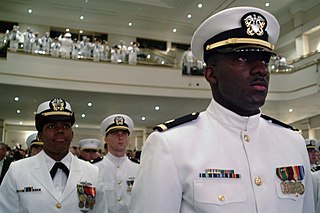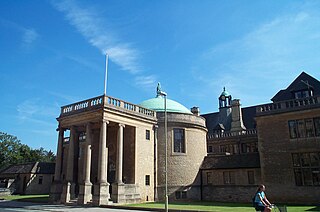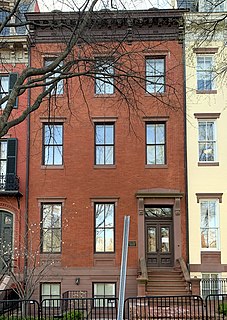Related Research Articles

The Ivy League is an American collegiate athletic conference comprising eight private research universities in the Northeastern United States. The term Ivy League is typically used beyond the sports context to refer to the eight schools as a group of elite colleges with connotations of academic excellence, selectivity in admissions, and social elitism. Its members are Brown University, Columbia University, Cornell University, Dartmouth College, Harvard University, the University of Pennsylvania, Princeton University, and Yale University.

The Johns Hopkins University is a private research university in Baltimore, Maryland. Founded in 1876, the university was named for its first benefactor, the American entrepreneur and philanthropist Johns Hopkins.

Berea College is a private liberal arts work college in Berea, Kentucky. Founded in 1855, Berea College was the first college in the Southern United States to be coeducational and racially integrated. Berea College charges no tuition; every admitted student is provided the equivalent of a four-year scholarship. There are still other fees, such as room and board, textbooks, and personal expenses. Most students receive grants or scholarships and do not have to take out many loans, if any at all.

The Reserve Officers' Training Corps (ROTC) is a group of college- and university-based officer training programs for training commissioned officers of the United States Armed Forces.

The Rhodes Scholarship is an international postgraduate award for students to study at the University of Oxford. Established in 1903, it is the oldest graduate scholarship in the world. It is considered among the most prestigious international scholarship programmes in the world. Its founder, Cecil John Rhodes, wanted to promote unity between English-speaking nations and instil a sense of civic-minded leadership and moral fortitude in future leaders, irrespective of their chosen career paths. Initially restricted to male applicants from countries that are today within the Commonwealth, Germany and the United States, the scholarship is now open to applicants from all backgrounds and genders around the world. Since its creation, controversy has surrounded its initial exclusion of women, historical failure to select black Africans, and Cecil Rhodes's own standing as a British imperialist.

The White House Fellows program is a federal fellowship program established via Executive Order by President of the United States Lyndon B. Johnson in October 1964, based upon a suggestion from John W. Gardner, then the president of Carnegie Corporation, who would eventually become the 6th Secretary of Health, Education, and Welfare. The mission of the program is "to give the Fellows first hand, high-level experience with the workings of the federal government and to increase their sense of participation in national affairs." President Johnson expected the Fellows to 'repay that privilege' when they left by 'continuing to work as private citizens on their public agendas.' He hoped that the Fellows would contribute to the nation as future leaders.
University of Phoenix (UoPX) is a private for-profit university headquartered in Phoenix, Arizona. Founded in 1976, the university confers certificates and degrees at the certificate, associate, bachelor's, master's, and doctoral degree levels. It is institutionally accredited by the Higher Learning Commission and has an open enrollment admissions policy, accepting all applicants with a high-school diploma, GED, or its equivalent as sufficient for admission. The school is owned by Apollo Global Management, an American private equity firm.

Kamehameha Schools, formerly called Kamehameha Schools Bishop Estate (KSBE), is a private school system in Hawaiʻi established by the Bernice Pauahi Bishop Estate, under the terms of the will of Princess Bernice Pauahi Bishop, who was a formal member of the House of Kamehameha. Bishop's will established a trust called the "Bernice Pauahi Bishop Estate" that is Hawaiʻi's largest private landowner. Originally established in 1887 as an all-boys school for native Hawaiian children, it shared its grounds with the Bishop Museum. After it moved to another location, the museum took over two school halls. Kamehameha Schools opened its girls' school in 1894. It became coeducational in 1965. The 600-acre (2.4 km2) Kapālama campus opened in 1931, while the Maui and Hawaiʻi campuses opened in 1996 and 2001, respectively.

NCAA Division III (D-III) is a division of the National Collegiate Athletic Association (NCAA) in the United States. D-III consists of athletic programs at colleges and universities that choose not to offer athletic scholarships to their student-athletes.

The Marshall Scholarship is a postgraduate scholarship for "intellectually distinguished young Americans [and] their country's future leaders" to study at any university in the United Kingdom. It is widely considered one of the most prestigious scholarships for U.S. citizens, and along with the Fulbright Scholarship, it is the only broadly available scholarship available to Americans to study at any university in the United Kingdom. Created by the Parliament of the United Kingdom in 1953 as a living gift to the United States in recognition of the generosity of Secretary of State George C. Marshall and the Marshall Plan in the wake of World War II, the goal of the scholarship was to strengthen the Special Relationship between the two countries for "the good of mankind in this turbulent world." The scholarships are awarded by the Marshall Aid Commemoration Commission and are largely funded by the British government. The program was also the first major co-educational British graduate scholarship; one-third of the inaugural cohort in 1954 were women.
Need-blind admission is a term used in the United States denoting a college admission policy in which an institution does not consider an applicant's financial situation when deciding admission. This policy generally increases the proportion of admitted students needing financial aid and often requires the institution to back the policy with an ample endowment or other sources of funding. Being need-blind is a statutory requirement for institutions to participate in an antitrust exemption granted by Congress which remains in effect until September 30, 2022. An institution may be need-blind in any given year by policy or by circumstances.
Higher education in the United States is an optional stage of formal learning following secondary education. Higher education is also referred as post-secondary education, third-stage, third-level, or tertiary education. It covers stages 5 to 8 on the International ISCED 2011 scale. It is delivered at 4,360 Title IV degree-granting institutions, known as colleges or universities. These may be public or private universities, research universities, liberal arts colleges, community colleges, or for-profit colleges. US higher education is loosely regulated by the government and by several third-party organizations.
College admissions in the United States refers to the process of applying for entrance to institutions of higher education for undergraduate study at one of the nation's colleges or universities. For those who intend to attend college immediately after high school, the college search usually begins in the eleventh grade with most activity taking place during the twelfth grade, although students at top high schools often begin the process during their tenth grade or earlier. In addition, there are considerable numbers of students who transfer from one college to another, as well as adults older than high school age who apply to college.
The Kalamazoo Promise is a pledge by a group of anonymous donors to pay up to 100 percent of tuition at many Michigan colleges and universities for graduates of the public high schools of Kalamazoo, Michigan. The Kalamazoo Promise applies to all of Michigan's state colleges and universities, as well as the 15 private colleges of the Michigan College Alliance and several apprenticeships and skilled trade programs. To receive the minimum 65% benefit, students must have lived within the Kalamazoo School District, attended public high school there for four years, and graduated. To receive a full scholarship, students must have attended Kalamazoo public schools since kindergarten.

The International Community School of Addis Ababa is an international school in Addis Ababa, Ethiopia founded in 1964.
The Polytechnic University of the Philippines College Entrance Test, commonly known as PUPCET, is part of the admission requirements in the Polytechnic University of the Philippines, administered to graduates of Philippine and foreign high schools. It is used to measure the capability of incoming students depending on what degree will the applicant choose. Of an estimated 50,000 annual entrance test examinees, only 8,000 will be accepted due to the university's limited budget.

The Arkwright Engineering Scholarship is an engineering award given to engineering students within the United Kingdom and Channel Islands. It has been running since 1991 and, as part of The Smallpeice Trust, has awarded over 5,000 scholarships to date.

Transfer admissions in the United States refers to college students changing universities during their college years. While estimates of transfer activity vary considerably, the consensus view is that it is substantial and increasing, although media coverage of student transfers is generally less than coverage of the high school to college transition. A common transfer path is students moving from two-year community colleges to four-year institutions, although there is also considerable movement between four-year institutions. Reasons for transferring include unhappiness with campus life, cost, and course and degree selection. There are no standardized rules nationwide for transfers, and requirements vary by college. However, many states have taken steps to make the transition easier and less problematic, particularly from community colleges to four-year schools within the state, by various methods including school-to-school credit arrangements called articulation agreements. While many state universities are constrained by budget cuts which have sometimes lessened the number of spots open to transfer students, there are reports that many private colleges are becoming more assertive in seeking transfer applicants. Nevertheless, the transfer process can be difficult, such that transfer applicants have been described as collegiate "academic nomads" who face various obstacles trying to make sure their credits transfer properly to their new school. Unlike admission from high school directly to college, there is less data nationwide about transfer admissions, although there are signs that this is changing.
The history of the Harvard Extension School dates back to its founding in 1910 by Abbott Lawrence Lowell. From the beginning, the Harvard Extension School was designed to serve the educational interests and needs of the greater Boston community, but has since extended its academic resources to the public, locally, nationally, and internationally.
The Evans Scholars Foundation is a nonprofit organization based in Glenview, Illinois that provides full tuition and housing college scholarships to golf caddies. Operated by the Western Golf Association, the Evans Scholars Foundation has helped more than 11,550 caddies graduate from college since its creation in 1930.
References
- 1 2 Hodson Scholars.Retrieved on 2021-08-01
- ↑ Johns Hopkins University. Hodson Trust. Retrieved on 2010-11-26.
- ↑ Rising to the challenge: The quiet contributors | Johns Hopkins University – The Gazette. Gazette.jhu.edu (2010-02-01). Retrieved on 2010-11-26.